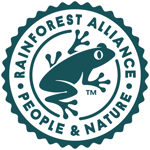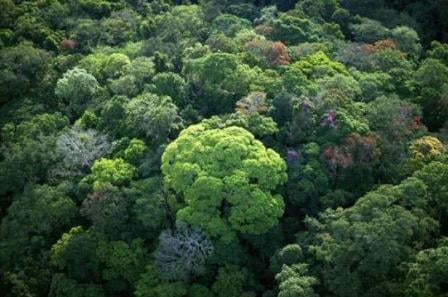
Mataverde Decking and Siding
Committed to Environmental Preservation
On this page:
- Environmentally Responsible Harvesting
- How It Works: Sustained Yield Forestry for Brazilian Tropical Hardwoods
-
The Brazilian Institute of Environment and Renewable Natural Resources (IBAMA)
- Forest Stewardship Council (FSC) Certified Wood Decking and Siding
- Rainforest Alliance - Guatemala Maya Biosphere Reserve
- Program for the Endorsement of Forest Certifications (PEFC) - Pacific Northwest, USA
- A Wood Rainscreen System For Healthy and Sustainable Design Standards
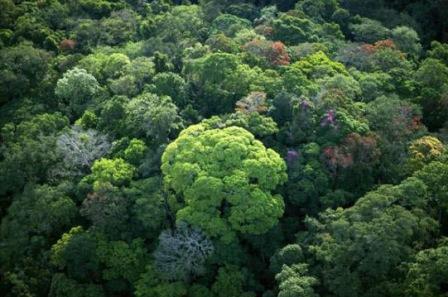
Our Commitment To Sustainable Products and Responsible Lumber Harvesting
At Mataverde Sustainable Decking and Siding Solutions, we have a deep commitment to sustainability and responsible harvesting practices. We believe in the beauty of your outdoor spaces while also contributing to environmental preservation. It is about ensuring that our products are not just durable and attractive but also eco-friendly.
An Ethical Foundation
Our journey towards sustainability begins with a firm ethical foundation and the importance of preserving our planet for future generations. This belief guides everything we do, from sourcing our materials to manufacturing our products.
We take great pride in offering sustainable hardwood decking options that are both environmentally conscious and premium quality. All of the wood used for Mataverde hardwood decking and eco-friendly rain screen siding options is collected in a well documented method which takes only what is needed and ensures that the trees will grow back.
Longevity and Durability are Important Factors
One of the core principles of sustainability is creating products that last. Mataverde decking and siding materials are renowned for being long-lasting and strong. When you invest in Mataverde materials you are making a sustainable choice by reducing the need for frequent replacements and minimizing waste.
At Mataverde, we believe that sustainability is not a destination but an ongoing journey. We invite you to join us in this working towards a greener, more sustainable future. By choosing Mataverde decking materials, you are making a conscious decision to support responsible harvesting practices and help protect our environment.
Environmentally Responsible Harvesting

A lumber worker in Guatemala practicing FSC® approved harvesting
Tropical forests will be preserved only if they are accorded economic value."
- Thomas Lovejoy, Tropical Forest Workshop, Smithsonian Institute
The preservation of the Amazon Rain Forest must be a concern for us all. This is a complex issue where political, social and economic demands conflict with ecological priorities.
Faced with the reality of family needs, the local population in the Amazon basin clears and burns portions of the Rain Forest to provide land for subsistence farming and cattle ranching. However, the nutrient poor land will only support farming or grazing for a few years. This has forced the clearing of more land in a spiraling cycle of deforestation.
Environmental preservation is of paramount importance. Proper and sustainable harvesting methods leaves very little negative impact on the environment, especially in tropical rainforests, where many of our tropical hardwood decking species grow. In addition, sustainable decking is strictly harvested under at least one of three Sustained Yield Forestry Programs, described in further detail below.
Sustained yield forestry (as defined) is an extremely important tool in reversing this process.
The sustainable yield of natural capital is the ecological yield that can be extracted without reducing the base of capital itself. Stated simply—harvest only enough that will grow back in between cutting cycles. For example: a forest that has recently suffered a blight or flooding or fire will require more of its own ecological yield to sustain and re-establish a mature forest. While doing so, the sustainable yield may be much less.
When properly planned and executed, sustained yield forestry can and has played an important role in:
-
Increasing the economic reliance on wood products which assigns a value to the forest and consequently will promote and help finance wise use and managed preservation.
-
Providing reliable income for the farmers from a source other than agriculture and cattle ranching.
How It Works: Sustained Yield Forestry for Brazilian Tropical Hardwoods
In Brazil, all Mataverde® Ipe, Cumaru, Garapa, Jatoba and other premium hardwood decking and siding timbers are harvested under the strict guidelines of three Sustained Yield Forestry Programs that extract hardwoods in accordance with the highest accepted standards of sustainable yield forest management: IBAMA, SEMA and FSC® (Forest Stewardship Council). Here are the details for each:

"These guidelines ensure that there will be just as many mature trees in 20 years as at the start of the harvesting project."
IBAMA
The Brazilian Institute of Environment and Renewable Natural Resources and receives any applications from landowners and logging entities for approval of a specific harvesting project.
IBAMA, with assistance from EMBRAPA, which is the Brazilian Agriculture Research Corp and its 40 research centers spread around Brazil (similar to the U. S Dept of Agriculture) employs a very detailed exhaustive analysis examining the many important factors in resource management and after thorough review renders a conditional decision.
This decision includes specific harvesting guidelines including:
-
-
Utilizing selective cutting methods which limit the cutting to one or two mature trees per hectare, and
-
Increasing sunlight and water to the remaining trees to promote steady growth and quality of specimen.
-
These guidelines ensure that there will be just as many mature trees in 20 years as at the start of the harvesting project. The volume of logs to be harvested is based on documented research that smaller trees exposed to the more sun and rain after a larger tree is harvested grows approximately 15 % faster. Thus no more than 15% of the mature trees will be harvested and then no more harvesting will be permitted on this project for approximately 20 years.

SEMA
SEMA is the acronym for the Brazilian Secretary of State for the Environment, with Hydro Resources operates as an agency of IBAMA. SEMA has instituted computerized satellite tracking to insure that logs and processed lumber are from approved projects. Furthermore, it requires that every entity in the supply chain have a SEMA secured website where proposed shipments are submitted for transportation approval.
REQUIREMENTS FOR TRANSPORT APPROVAL
-
- Shipper must declare quantity of shipment
- Declare registration number of vehicle that will be used for transport
- Identify a 10 day period during which the shipment will be transported
- Identify the route the declared vehicle will travel
- Shipper must declare quantity of shipment
SEMA monitors shipments by satellite and any vehicles not approved for transport are impounded while an investigation takes place. Properly documented shipment volume is then added to the receiver's SEMA website inventory and deducted from the shipper's SEMA website inventory.
Any volume attempted to be transported or exported in excess of a company's website inventory triggers a shutdown of SEMA website and an audit of the offender's physical inventory is conducted. If any discrepancies are discovered a very significant fine is levied against the offender. If a second offense is discovered then the company's SEMA website is shutdown and the company is unable to conduct lumber business of any kind.

Forest Stewardship Council® (FSC)
The Forest Stewardship Council is an independent, non-governmental, not-for-profit organization established to promote the responsible management of the world's forests.
FSC provides standard setting, trademark assurance, accreditation services, and market access for companies and organizations interested in responsible forestry. Products carrying the FSC label are independently certified to assure consumers that they come from forests that are managed to meet the social, economic and ecological needs of present and future generations.
Mataverde FSC product offerings are from a supply chain wherein all suppliers are certified by the Forest Stewardship Council. Please contact us for additional information for specific products and project needs.
We are constantly searching worldwide for additional Mataverde Wood Decking and Wood Siding materials that can be included in our FSC Certified material offerings.
General Woodcraft is a licensed FSC Chain of Custody Supplier, Trademark License #CO23385, certified by Bureau Veritas a global Chain of Custody certification bureau. Our Certificate Code is: BV-COC-023385.
All Mataverde FSC® Certified Hardwood Options
Products carrying the FSC label are independently certified to assure consumers that they come from forests that are managed to meet the social, economic and ecological needs of present and future generations.
Many Mataverde Hardwood products are available as certified materials including:
- FSC Machiche Decking and Siding
- FSC Ipe Decking and Siding
- FSC Jatoba Decking and Siding
- FSC Garapa Decking and Siding
- FSC Cumaru Decking and Siding
FSC Machiche Wood Is A Versatile Species

Although Mahogany, Cedar, Santa Maria, and Pine are the most common wood species being harvested in Guatemala, FSC Certified Machiche hardwood is an up-and-coming species
Machiche wood isn’t just a beautiful wood species. It is every bit as hard, dense, strong, and durable as it is beautiful. Machiche hardwood makes excellent decking, trim, and siding boards.
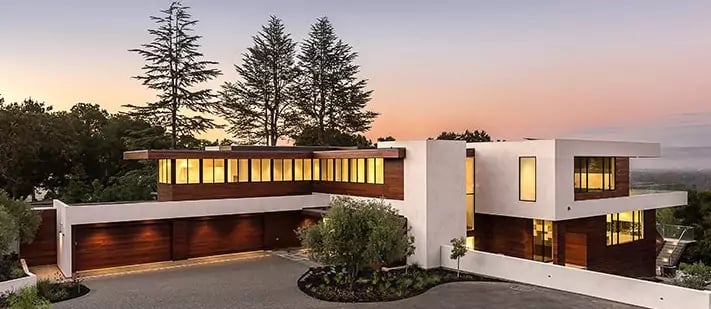 FSC Machiche Rainscreen Siding was used throughout this custom hom
FSC Machiche Rainscreen Siding was used throughout this custom hom
With Machiche hardwood, the sustainability aspects don't stop at the forest. Machiche is such a durable wood species, it has an extended usable lifetime, even outdoors. This means lower overall lifecycle costs. And low lifecycle costs are one of the hallmarks of sustainable design and green building practices.
Want to know more? Read our full blog article here: "Buy Machiche Wood and Help Save The Forest"
Rainforest Alliance - Guatemalan Maya Biosphere
“Does community forestry work as a conservation strategy? Let’s put it this way: the forest concessions of the Maya Biosphere Reserve have boasted a near-zero deforestation rate for 20 years.”
– from Community: The Secret to Stopping Deforestation in Guatemala, @Rainforest-Alliance.org
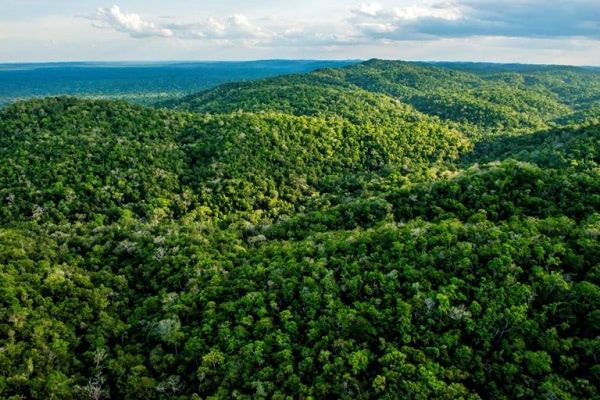
The Mayan Biosphere Reserve, a place with communities, significant ecological features, and important eco-systems
In the Mayan Biosphere Reserve in Guatemala, sustained yield forestry is monitored by both the The Forest Stewardship Council and the Rainforest Alliance. The Guatemalan Maya Biosphere Reserve (MBR) is a protected nature reserve that covers 20% of the land area of Guatemala. It was created in 1990 to help preserve and protect the largest tropical rainforest in the world north of the equator.
Sustainable Forestry at its Best
The MBR is not a typical protected forest area. It contains a network of individual community forest concessions (CFC’s). Each of these concessions is managed by the individual communities. The Guatemalan government has allowed the indigenous people to make a living from the forest – provided they do so sustainably. The people of the forest are protecting their forest - and their livelihood – and their communities. They have a vested interest in protecting the forest and their homes.
How well is the community model working?
With near zero percent deforestation, this community-based model boasts the best performance of forest stewardship anywhere on earth. Beautiful tropical hardwood species such as Machiche and Santa Maria are sustainably harvested in this vast natural resource area.
A Wood Rainscreen System For Healthy and Sustainable Design Standards

The Climate-Shield Rain Screen Wood Siding System is an innovative green building product. This patented technology allows architects, builders, and owners the opportunity to design by healthy sustainable design standards and practices.
Since it eliminates furring strips and offers design versatility, the Climate-Shield Rainscreen Wood Siding System works extremely well with Mataverde hardwood siding.
Download a copy of the Ultimate Guide to Wood Rainscreen Siding now and elevate your next sustainable exterior design project.

Program for the Endorsement of Forest Certification - Pacific Northwest
 ThermaWood Hem-Fir thermally modified siding detail
ThermaWood Hem-Fir thermally modified siding detail
Sustainable forestry practices are not limited to tropical forests. There are some great practices in place in North America. Mataverde ThermaWood Hem-Fir Siding and Decking are sourced through responsible foresters who harvest their timber under PEFC Guidelines (Program for the Endorsement of Forest Certification). The PEFC Chain of Custody ensures proper forest management practices are in place to provide eco-friendly renewable resources.
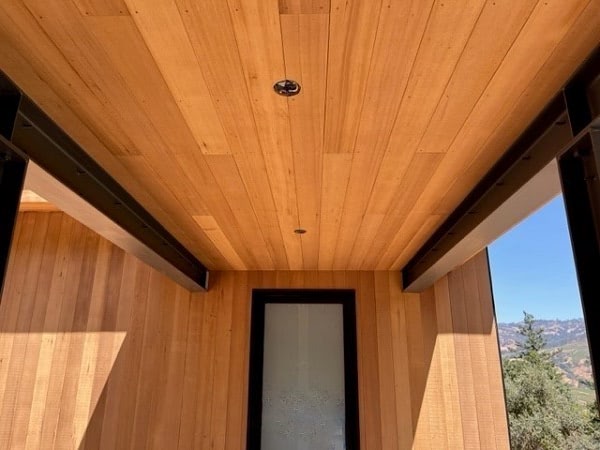 Breezeway at a custom home uses ThermaWood Hem-Fir as siding and in soffits
Breezeway at a custom home uses ThermaWood Hem-Fir as siding and in soffits
Do you have questions on our sustainable wood decking and siding materials? Contact us now, we're ready to help get your project started.


